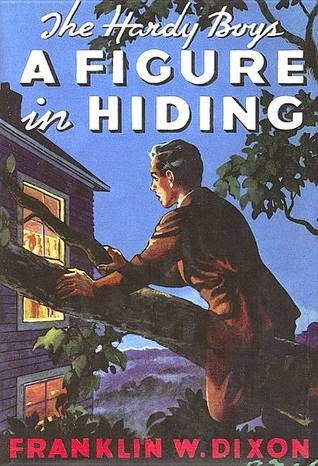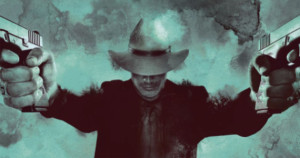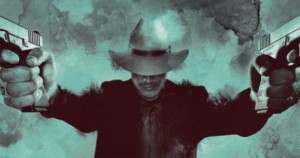Category Archives: justified
The Serial Killer
Parched For Readers
TV Shows I’m Addicted To
I have my DVR set up with countless shows I record. My husband also knows my interest in the strange and peculiar NOVA Science shows or historical documentaries. As a writer, anything can stir your imagination and you never know what small tidbit can fuel a book or series. I once did a whole proposal after seeing a science show on venomous snakes.
Here are a couple of my fav TV shows adapted from books:
Hannibal – OMG! I am giddy for Thursday nights now because of this show. This is an adaptation of Red Dragon by Thomas Harris, but it is a prequel where FBI BAU profiler, Agent Will Graham, is brought in to consult with his old boss, Jack Crawford, and hunt serial killers. We meet the infamous Hannibal Lecter in the wild, before he gets caught. Will is good at his job, depicted as closer to Asperger’s & sociopaths, and can visualize himself as the killer. This puts him in need of therapy, as you can imagine, but his boss picks Hannibal Lecter as his psychiatrist. This is graphic stuff, but the tongue in cheek dark humor is over the top and the psychological trauma worsens in Will, as we see him falling apart and under the care of Lecter. It’s mesmerizing to watch. Hugh Dancy is yummy as Will Graham and Mads Mikkelson as Hannibal redefines the role, big shoes to fill after Anthony Hopkins.
This show is beautifully shot and the acting is amazing, but the reinvention of the Red Dragon book, in such a creative way, has me coming back every week. I went back to read the book and got even more out of the show.
Justified – This show’s season has ended, but it gets better each year. Writer Elmore Leonard is the guy behind this show and the writing is superb. The characterizations and the dialogue are worth every minute of your time to watch this show. One of my favorite things to do is tweet my fav lines as the show is one. Many of my writer friends do this. Marshal Raylan Givens and criminal childhood friend Boyd Crowder are two characters to watch. The season that just ended was my favorite (and that’s saying something). Pure Rayland and Boyd.
Cable Shows I Have Recently Become Addicted to:
The Borgias – Jeremy Irons is damned sexy as a Pope. And his son, Cesare Borgia, has me spellbound…especially when he’s naked. Family scandal and treachery in enticing scenes.
Game of Thrones –I hadn’t watched this show until I recently caught up in a marathon of recordings, but I got totally hooked. Some of the recent storylines left me so sad though and it reminded me how emotional our stories have to be to grip readers.
What are some of your favorite guilty pleasure TV shows…and why do you like them? Do you get something from them that helps your writing? Are you addicted to any of the shows I watch?
I Am JUSTIFIED
It’s been crazy since the holidays between my writing deadlines, promotion for my latest release Indigo Awakening, and all the relatives coming in and out of town. But this week I’ve been saved. Elmore Leonard’s Justified is back for Season 4 and the first episode – Hole in the Wall – did not disappoint. It was “happy dance” fun.
Yes, Raylan and his bad ass Hat-itude inspires me to dig deep for insanely evocative dialogue and characters that make me cringe and laugh at the same time. I see this series as pure writer inspiration. (I love Elmore Leonard.) There were shockers in this first show. Don’t worry. No spoilers, but for anyone who saw it, I’m already filling my Constable Bob “Go To” bag with all the necessaries to kick some fictional butt in 2013.
What would you put in YOUR “go to” writer’s bag this year? Any resolutions? Here are FIVE writer things I learned from being JUSTIFIED.
1.) Never discount the importance of a good secondary character. Constable Bob is a prime example of how a well-written secondary character can steal your scenes and maybe become a spin-off.
2.) Writing one book can lead to another if you plant the seeds. Add a super hot bail bonds woman, a hotel mini-bar, and a marshal with pliable ethics and you can have a future book plot. Leave threads or seeds to another plot in your current work-in-progress. It never hurts to have ideas and it may leave readers wanting more.
3.) Dark humor is gold. When a loaded hooker comes face to face with something “grizzly” in her place of “business” or a simple phrase like “take care of him” can be construed in more than one way, a well-placed bullet can be JUSTIFIED funny.
4.) Give your anti-heroes loads of baggage and a cast of characters around them that will push their ethics to their darkest depths. Test them. Right from the start, Raylan is tempted into “helping” bring a fugitive to justice, especially if he can benefit from a little bounty money on the side and sees no harm in taking a modest gratuity. What comes next escalates his woes into pure Raylan MO when he has to cover his butt from getting caught. (Hint: If you talk too much, you get a special seat in his car.)
5.) To get a great pace going, jump into the plot without too much back story. The sheer mystery will draw readers in until your reveal. Have patience and don’t “telegraph” where you’re headed. Readers love a twist they never saw coming.
For the premiere, I followed twitter hashtag #JUSTIFIED while I watched the show to see what followers found interesting or memorable. Die hard fans are hilarious and they often quote whole lines to let everyone know what got to them. Twitterville heated up with Justified fans and I had even more fun. Many writers joined in the fun.
So tell me what you’d put in your writer’s TO GO bag for 2013—to be ready for anything like Constable Bob. Or please share what JUSTIFIED has taught you, whether you’re a reader or writer. (I’m pretty sure I’ll never ask Raylan’s daddy Arlo about what he likes to read. Just sayin’.)
Here’s a sneak preview of next week’s episode. If you have trouble viewing it, here is the Youtube link: http://youtu.be/mtMFLlk5lKk








